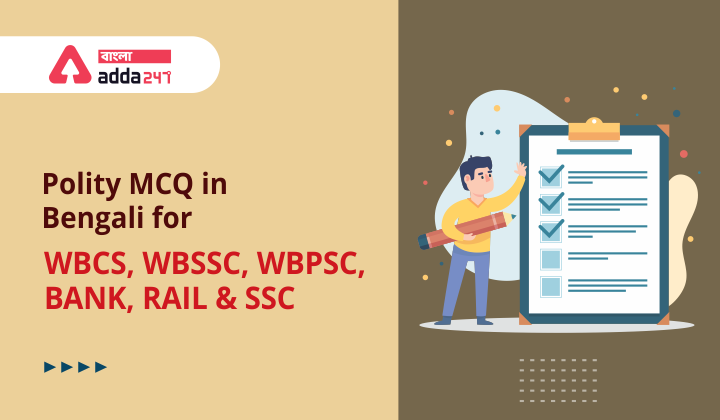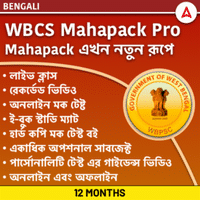Table of Contents
Polity MCQ in Bengali: Welcome to Adda 247. ADDA 247 Bengali is giving you Polity MCQ in Bengali for WBCS exam. Here you get Multiple Choice Questions and Answers with Solutions every day. Here you will find all the important questions and answers that will help you increase your knowledge and move you towards fulfilling your goals. Study these Polity MCQs regularly and succeed in the exams.
| Polity MCQ in Bengali | |
| Topic | Polity MCQ |
| Category | Daily Quiz |
| Used for | WBCS Exam |

পলিটি MCQ | Polity MCQ
Q1. নিম্নলিখিত কোনটি গণতন্ত্র হিসাবে বিবেচিত হয় না?
(a) মার্কিন যুক্তরাষ্ট্র
(b) নরওয়ে
(c) ভারত
(d) চীন
Q2. সর্বোচ্চ কত সময়ের জন্য ভারতের রাষ্ট্রপতির পদ খালি থাকতে পারে?
(a) 2 মাস
(b) 6 মাস
(c) 3 মাস
(d) এটি খালি থাকতে পারে না
Q3. মূলত সংবিধানের 19 এবং 31 অনুচ্ছেদ সম্পত্তির অধিকার সরবরাহ করেছিল। নিম্নলিখিত সংশোধনীগুলির মধ্যে দিয়ে যা মৌলিক অধিকারের তালিকা থেকে সম্পত্তির অধিকারকে সরিয়ে দিয়েছে।
(a) 42 তম সংশোধনী আইন, 1976
(b) 44 তম সংশোধনী আইন, 1976
(c) 42 তম সংশোধনী আইন, 1978
(d) 44 তম সংশোধনী আইন, 1978
Q4. প্রতিটি নির্বাচনে, অবাধ ও সুষ্ঠুভাবে নির্বাচন পরিচালনার জন্য ভারতের নির্বাচন কমিশন রাজনৈতিক দল এবং প্রার্থীদের জন্য একটি আদর্শ আচরণবিধি জারি করে।কবে প্রথমবারের মতো আচরণবিধি জারি করা হয়েছিল?
(a) 1951
(b) 1968
(c) 1971
(d) 1991
Q5. নিম্নলিখিত ভাষাগুলির থেকে মহারাষ্ট্রের সরকারী ভাষাটি বেছে নিন-
(a) হিন্দি
(b) উর্দু
(c) মারাঠি
(d) গুজরাটি
Q6. এর মধ্যে কোনটি ভারতীয় সংবিধানে মৌলিক অধিকার হিসেবে অন্তর্ভুক্ত নয়?
(a) বাক স্বাধীনতার অধিকার
(b) আইনের সামনে সমতার অধিকার
(c) সাংবিধানিক প্রতিকারের অধিকার
(d) সমান কাজের জন্য সমান মজুরি পাওয়ার অধিকার
Q7. কোন মৌলিক অধিকারকে ভারতীয় সংবিধানের হৃদয় ও আত্মা বলা হয়?
(a) সাংবিধানিক প্রতিকারের অধিকার
(b) বাক স্বাধীনতার অধিকার
(c) আইনের সামনে সমতার অধিকার
(d) ধর্মীয় স্বাধীনতার অধিকার
Q8. কার শাসনকালে সম্পত্তির অধিকারকে মৌলিক অধিকারের তালিকা থেকে বাদ দেওয়া হয়েছিল:
(a) ইন্দিরা গান্ধী সরকার
(b) মোরারজি দেশাই সরকার
(c) নরসিংহ রাও সরকার
(d) বাজপেয়ী সরকার
Q9. নিচের কোনটি রাজনৈতিক অধিকারকে অন্তর্ভুক্ত করে না?
(a) ভোটের অধিকার
(b) জীবনের অধিকার
(c) নির্বাচনে প্রতিদ্বন্দ্বিতা করার অধিকার
(d) সরকারের নির্বাহী সংস্থার কাছে অভিযোগ করার অধিকার
Q10. নিম্নলিখিত অধিকারগুলির মধ্যে কোনটি বর্তমানে ভারতের সংবিধান দ্বারা একটি মৌলিক অধিকার হিসাবে মঞ্জুর করা হয় না?
(a) সমতার অধিকার
(b) স্বাধীনতার অধিকার
(c) সম্পত্তির অধিকার
(d) শোষণের বিরুদ্ধে অধিকার
Polity MCQ Solutions |পলিটি MCQ সমাধান
S1.Ans.(d)
Sol. Four divisions, the legislative, executive, judiciary, and military, comprise the Communist Government of the People’s Republic of China.
S2. Ans.(d)
Sol. The office of President of India cannot remain vacant.
Article 65 of the Indian constitution says that the Vice-President of India will have to discharge the duties, if the office falls vacant due to any reason other than the expiry of the term.
S3. Ans.(d)
Sol. The Constitution originally provided for the right to property under Articles 19 and 31.
The provisions relating to the right to property were changed a number of times. The 44th Amendment of 1978 removed the right to property from the list of fundamental rights.
A new provision, Article 300-A, was added to the constitution, which provided that “no person shall be deprived of his property save by authority of law”.
S4. Ans.(c)
Sol.Holding periodic, free and fair elections are essentials of a democratic system and a part of the basic structure of the Constitution.
In every election, it issues a Model Code of Conduct for political parties and candidates to conduct elections in a free and fair manner.
The commission issued the Code of Conduct for the first time in 1971 for the 5th Lok Sabha elections and has revised it from time to time.
S5. Ans.(c)
Sol.
Marathi is the official language of Maharashtra and co-official language in the union territories of Daman and Diu and Dadra and Nagar Haveli.
S6. Ans.(d)
Sol.
The six fundamental rights recognised by the Indian constitution are the right to equality, right to freedom, right against exploitation, right to freedom of religion, cultural and educational rights, right to constitutional remedies.
S7. Ans.(a)
Sol.
Dr. B.R.Ambedkar called ‘Article 32’ of the Indian Constitution i.e. Right to Constitutional remedies as ‘the heart and soul of the Constitution’.
S8. Ans.(b)
Sol.
The 44th amendment to the Indian Constitution was passed after the revocation of internal emergency in 1977. It was instead made a constitutional right under Article 300A which states that. ” No person can be deprived of his property except by authority of law.”
S9. Ans.(b)
Sol.
The Constitution of India provides Fundamental Rights under Chapter III. Article 21. Protection Of Life And Personal Liberty: No person shall be deprived of his life or personal liberty except according to procedure established by law.
S10. Ans.(c)
Sol.
In the year 1977, the 44th amendment eliminated the right to acquire, hold and dispose of property as a fundamental right. However, in another part of the Constitution, Article 300 (A) was inserted to affirm that no person shall be deprived of his property save by authority of law.




